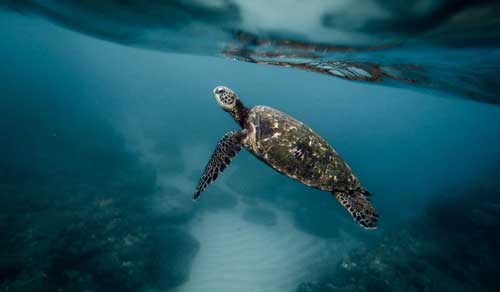Dressed in bright orange jumpsuits and matching masks, Cara Megill ’21 and Jacqui Roush ’23 stood at Conimicut Point in Warwick and flipped a switch to begin pumping about 50 gallons of seawater through a complex filter system designed and built by their advisors, Andrew Davies and Coleen Suckling.
It’s a process the students repeated almost daily last summer at a dozen sites around Narragansett Bay as part of a research project to document the location, concentration, and movement of microplastics in the bay. They also deployed a net from a boat to skim for plastics at the water’s surface.
“We were hoping to get an idea of how microplastics are dispersed across the bay, if more are concentrated in some places than others, and how it changes with time and weather,” explained Roush, a sophomore majoring in marine biology and ocean engineering. “The project relates to a lot of issues around the bay, like the impact of microplastics on aquaculture and its effect on the local ecology.”
Roush and Megill, a senior marine biology and chemistry major, found microscopic pieces of plastic at every site they tested—Rhode Island coastal locations from Point Judith to Providence as well as at sites in the middle of the bay. The took their samples back to Suckling’s laboratory to filter out non-plastic particles, and then analyzed each sample to identify the source of the plastic and determine how it got into the bay.
“A lot of the samples are very tiny plastic fibers and unidentified plastic beads,” Megill said. “We get some algae and jellyfish and cotton fibers, too, but those get removed when we process the samples. From what we’ve seen so far, we’re getting mostly plastics that look like they came from fishing line and plastic fibers from clothing that came out in the laundry.”
‘Best of both worlds’
The students’ research is supported by the URI Coastal Fellows program, a unique initiative designed to involve undergraduate students in addressing current environmental problems. Now in its 24th year, the program pairs students with a mentor and research staff to help them gain skills relevant to their academic major and future occupations. It’s one of many undergraduate research initiatives at URI that provide students with opportunities to gain hands-on experience. In December, Roush and Megill participated in the 2020 Virtual Undergraduate Research Symposium, where they presented their findings.
“It’s really the best of both worlds. I’m getting experience working in the field as well as in the lab,” said Megill, who got hooked on marine science while vacationing with her family in Bermuda. “It’s been a great learning experience about microplastics and about the research process in general.”
Roush agreed. “This was my first intense career experience in marine biology,” she said, “and I really liked the satisfaction of doing the work ourselves and contributing to something as important as this.”

